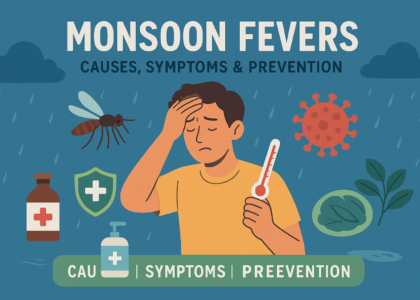Understanding Urinary Tract Infections (UTIs)
By Dr. Sonal Jain, MBBS, MD (Internal Medicine)
Specialist in Adult Health | Dr. Sonal’s Health Care Centre
Urinary Tract Infections (UTIs) are among the most common infections, particularly in women. They can range from a simple bladder infection to more serious kidney infections. Prompt diagnosis and treatment are key to avoiding complications.
🔍 What is a UTI?
A UTI occurs when bacteria—most commonly E. coli—enter the urinary tract and multiply. This can lead to inflammation and discomfort, primarily in the bladder, but sometimes affecting the kidneys.
🧠 Types of UTIs
-
Cystitis: Infection of the bladder (most common)
-
Urethritis: Infection of the urethra
-
Pyelonephritis: Infection of the kidneys (more severe and urgent)
⚠️ Common Symptoms
-
Burning sensation while urinating
-
Frequent urge to urinate
-
Cloudy or foul-smelling urine
-
Pelvic or lower abdominal pain
-
Fever and back pain (if kidneys are involved)
👩⚕️ Who is at Risk?
-
Women (due to shorter urethra)
-
Pregnant women
-
Diabetics
-
Postmenopausal women
-
Men with prostate enlargement
-
People with kidney stones or catheters
🧪 How is it Diagnosed?
-
Urine Routine and Microscopy
-
Urine Culture and Sensitivity
-
Ultrasound (if infections are recurrent or complicated)
💊 Treatment Options
-
Antibiotics based on culture results
-
Increased fluid intake to flush bacteria
-
Pain relief for discomfort
-
Longer or tailored treatments for complicated/recurrent UTIs
🔁 What About Recurrent UTIs?
If you’re getting UTIs frequently, you may need a deeper evaluation for:
-
Bladder emptying problems
-
Kidney stones or structural issues
-
Blood sugar control (in diabetics)
-
Hormonal changes (e.g., menopause)
We create personalized prevention strategies for such patients.
✅ Tips to Prevent UTIs
-
Drink 2–3 liters of water daily
-
Maintain intimate hygiene
-
Avoid holding urine for long
-
Wipe front to back after using the toilet
-
Urinate after intercourse
-
Avoid harsh soaps and sprays
-
Wear breathable cotton undergarments
🩺 When Should You See a Doctor?
If you have:
-
High fever or chills
-
Pain in the back or side
-
Blood in urine
-
Symptoms lasting more than 2 days
Don’t delay treatment—early intervention prevents complications.
👩⚕️ Care You Can Trust
At Dr. Sonal’s Health Care Centre, we offer:
-
Prompt diagnosis
-
Targeted treatment
-
Recurrent UTI evaluation
-
Personalized prevention plans
📞 Call us: 9701073615
🌐 Visit: www.drsonaljainmd.com







